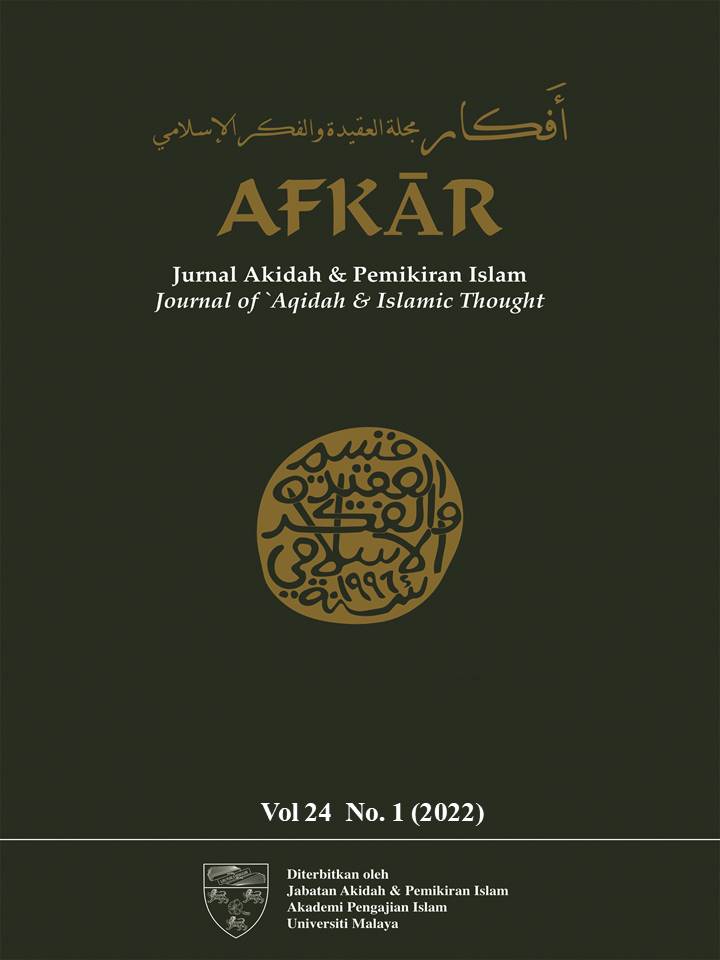The Existence and the Challenges of Sufi Literature in Indonesia
DOI:
https://doi.org/10.22452/afkar.vol24no1.7Keywords:
Sufi; literature; mystical; transcendental; Indonesia.Abstract
The article is aimed at elaborating on the challenges of Sufi literature in Indonesia. This research is library research using a historical approach to obtain data and conducting content analysis. This research shows that Sufi literary treasures are the largest and most important part of the Islamic literature treasury. Sufi poets are not only pioneers in the revival of national literature in their countries, but they are also pioneers of the rise of the Islamic world. Sufis did not write mystical and transcendental works which are individualistic in nature. Their works are also associated with a social life that appeared in political allegory and literary whit history patterns. Sufism has influenced Indonesian literature since the early era of the spread of Islam in the Archipelago, i.e., in the 13th century. The emergence and development of Sufi literature in Indonesia is a direct impact on the swift process of Islamization, in which among the main actors are saints, scholars, teachers, and Sufi scholars. The works of the 16th-18th centuries have their position in the overall history of Islamic intellectuals in Indonesia. There are many important aspects in these works, especially those related to the way of life, the picture of the world (weltanschauung), and the value system of society. Even these Sufi works influence modern Indonesian literature. The existence of Sufi literature in Indonesia in this modern era is being challenged. The technical issues such as difficulty in obtaining theory and material resources, as well as references for Islamic aesthetics, literature, and culture, were often propounded as a reason for the less attention to the study of Sufi literature. In reality, the real reason is not purely technical; it is caused by the domination of Western theory in their minds, especially from the philosophy of neo-positivism also there is an assumption that non-Western theory has never grown the relevant theory of literary and aesthetics.
Downloads
References
Arif, Ridwan and Mahbub, Fuad. “Shaykh ‘Abd al-Ra’uf al-Fansuri (1615-1693CE): A Study of His Contribution to the Development of Islamic Education in The Malay World.” Afkar: Journal of Aqidah & Islamic Thought 22(2) (2020): 205-23. https://doi.org/10.22452/afkar.vol22no2.6.
Demirli, Ekrem. “The Problem of Periodization in Sufi Studies: The Struggle of Sufism to Become a Discipline Between the Religious Sciences and Metaphysics.” Nazariyat Journal for the History of Islamic Philosophy and Sciences 2(4) (2016): 1-32. https://doi.org/10.12658/Nazariyat.2.4.M0030.
Fang, Liaw Yock. Sejarah Kesusastraan Melayu Klasik. Jakarta: Pustaka Obor Indonesia. 2011.
Green, Nile. “Emerging Approaches to the Sufi Traditions of South Asia: Between Texts, Territories and the Transcendent.” South Asia Research 24(2) (2004): 123–48. https://doi.org/10.1177/0262728004047908.
Howell, Julia Day. “Sufism and the Indonesian Islamic Revival.” The Journal of Asian Studies 60(3) (2001): 701-29. https://doi:10.2307/2700107.
Hongxuan, Lin. “English as an Islamic Cosmopolitan Vernacular: English-Language Sufi Devotional Literature in Singapore.” Southeast Asian Studies 6(3) (2017): 447-484.
Hadi WM, Abdul. Sastra Sufi: Sebuah Antologi. Jakarta. Pustaka Firdaus, 1985.
Hadi WM, Abdul. Kembali Ke Akar Kembali Ke Sumber: Esai-Esai Satra Profetik dan Sufistik. Jakarta. Pustaka Firdaus, 1999.
Hadi WM, Abdul. “Puisi, Estetika dan Masyrakat.” Arus Sastra Kalimantan Selatan. 25-27 December 2009.
Hadi WM, Abdul. Cakrawala Budaya Islam: Sastra, Hikmah, Sejarah dan Estetika. Yogyakarta. IRCiSoD, 2016.
Hadi WM, Abdul. Hermeneutika, Estetika dan Religiusitas: Esai-esai Sastra Sufistik dan Seni Rupa. Jakarta. Sadra Press, 2016.
Hadi WM, Abdul. “Pengaruh Parsi terhadap Sastra Sufistik Melayu Islam.” Jurnal Ilmu Ushuluddin 2(1) (2014): 21-34.
Hadi WM, Abdul. Hermeneutika Sastra Barat dan Timur. Jakarta: Sadra Press, 2014.
Kamil, Sukron. Teori Kritik Sastra Arab: Klasik dan Modern. Jakarta: Rajawali Pers, 2012.
Manshur, Fadlil Munawwar. Sejarah Perkembangan Kesusastraan Arab Klasik dan Modern. Makalah Seminar International Bahasa Arab dan Sastra Islam, Bandung, 2007.
Mangunwijaya, YB. Sastra dan Religiusitas. Jakarta. Sinar Harapan, 1982.
Rosidi, Ajip. Kapankah Kesusastraan Indonesia Lahir. Jakarta: CV Haji Masagung, 1988.
Saridjo, Marwan. Sastra dan Agama: Tinjauan Kesusastraan Indonesia Modern Bercorak Islam. Jakarta: Yayasan Ngali Aksara, 2006.
Yatim, Badri. Sejarah Peradaban Islam. Jakarta: PT. Raja Grafindo Persada, 1993.









